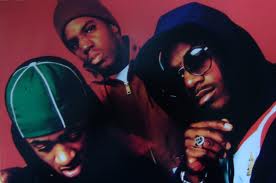
Brooklyn Hip Hop legends Black Moon discuss their debut release Enta Da Stage
By Andrew Gretchko
In 1993, a group of Brooklynites got together to create what has been called one of the greatest albums of hip-hop’s golden age. Two decades later, Black Moon’s “Enta Da Stage” was remembered by its creators and its fans alike at the Brooklyn Historical Society during the “Hip-Hop 101: Told It First Hand” event, which featured the group’s producer, Evil Dee; one of Black Moon’s two emcees, Buckshot; and the author of the critically acclaimed hip-hop book “Check the Technique,” Brian Coleman.
The first in a series of events hosted by Wes Jackson, the founder and Executive Director of the Brooklyn Hip-Hop Festival and the President of Brooklyn Bodega, Hip-Hop 101: Told It First Hand allowed the artists to speak during a panel-style discussion that involved reminiscent recounting of numerous stories from the group’s birth, its rise to success and the impact it had on hip-hop and society at-large.
“You ready?” Buckshot said to the crowd during one of the many animated segments of the discussion, recalling a time when Black Moon had broken into a nearly spontaneous set in order to woo record labels and promoters. “Next thing you know, I was on this wall, E was on this wall, and we were jumping around,” he recalled, prompting laughter as he explained how the group’s roots in dancing were so vital to its success.
“At the time, we believed in being energetic and we were doing things that made us look like acrobats,” said Buckshot, who along with fellow Black Moon emcee 5 Ft., had previously been a dancer until around 1991. According to Buckshot, part of the reason DJ Chuck Chillout was able to help get the group its first record deal was because he had seen the intensity of one of the group’s performances. As Jackson noted, “You guys always got noticed especially for [your live shows.]”
Still new to the rap scene at the time, Black Moon relished their first record deal, but were more concerned with pumping out tracks than making a classic album. “We weren’t thinking about business, we were thinking about let’s make our album; let’s make a good album. Let’s make good music,” said Evil Dee, who recalled being happy that the group would be able to record their music – for which they earned $1,000 per track – in a real studio rather than some of the less-than-professional areas they had previously recorded in. Luckily, the group had no trouble producing hits.
When asked about the pop-yet-hard sound of the group’s hit tracks like “Who Got Da Props?” and “I Got Cha Opin,” producer Evil Dee answered, “You can take anything and put it on some hard drums and it becomes hard. And you can take a bass line and filter it like crazy until it’s just bass. And then you just turn it up. To me, hard bass and hard drums is hip-hop.” True to his producer roots, Evil Dee continued, saying, “If we didn’t blow a fuse in the studio, our album was whack.”
During the Q&A session, one fan praised the group for their fashion sense, stating that they influenced him to wear a puffy jacket and hat similar to the attire Buckshot helped popularize during the early ‘90s, even when he lived in the tropical climate of Trinidad. “Man, I got that hat for $5!” said Buckshot, before Evil Dee reflected on Black Moon’s success by saying, “At a show in Canada I walked out on stage and saw 2,000 Buckshots and I thought to myself ‘We finally made it.’”
